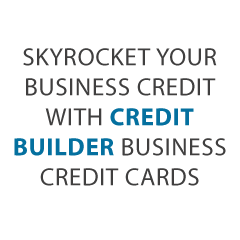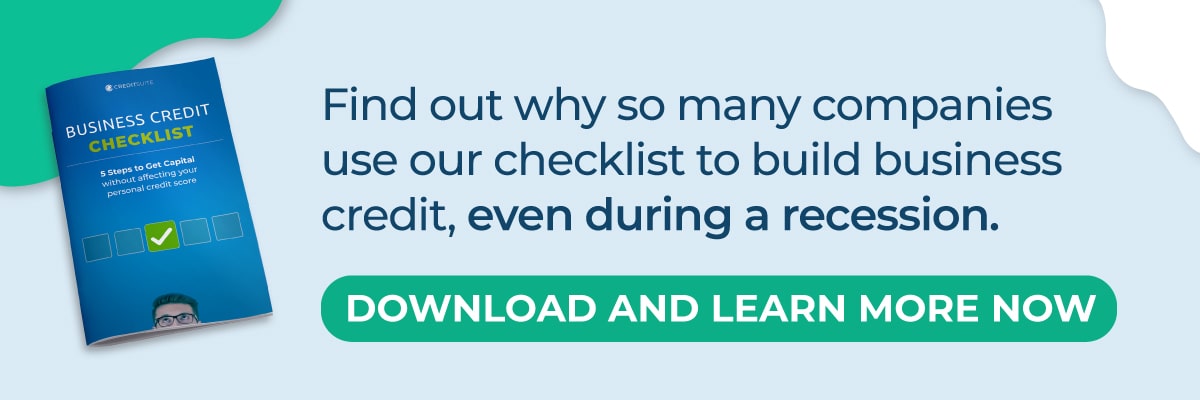All the Cool Kids are Getting Business Credit, Here’s How You Can Get It Too
Getting business credit isn’t necessarily hard, but it does take some effort and planning. There is a process, and you have to work for it. Who gets business credit? How can you get business credit? Do you even need company credit? These are all perfectly normal questions, as many entrepreneurs think they have to fund their business based solely on their personal credit. This just isn’t the case however.
For many, business credit is like the fairy godmother of the business world. It can take your company and put it in the elite class of businesses which are fundable on their own merits. While all types of businesses can get business credit, some are getting it more often than others.
Top 10 Industries Getting Business Credit
1. Hospitality
Not so much hotels, but more like the newcomers similar to AirBnb, HomeAway, and VRBO. This is an innovative way to stay when you travel. And more like these are coming along. It gives consumers options. Consumers like options.
2. Real Estate
Real estate refers more to house resale, or house flipping, than other types of real estate. Before the last recession this was big news, and then the bubble burst. It’s back and stronger than ever for now however. Of course, there is always the lingering potential pin poke of the next recession looming nearby, but for now, that is not stopping them.
3. Long Haul Truckers
There will always be a need for an affordable way to get things from one place to another, and long-haul truckers are just that.
4. Finance
Not just any financial business, but those related to credit building are building company credit right now. Businesses that help companies and individuals build their credit score are a big deal.
5. Food Delivery
Services that offer food pickup and delivery services such as DoorDash and GrubHub are growing and expanding, and they are getting business credit to do it.
6. Energy Conservation
Energy conservation is huge right now, and companies that are working toward that end are establishing business credit to help make it happen.
7. Health
There are two factions of the health industry building business credit frequently right now. Data and file management is in the news as there is a push for records consolidation across the board to ensure patient files are as comprehensive and complete as possible. Personalized health is also a hot topic, as more and more providers are realizing health care does not have a one size fits all solution. Business credit is helping providers in both areas thrive.
8. Entertainment Technology (Apps, gaming, streaming)
Netflix, Hulu, and all the other streaming apps prove that this isn’t an industry that is going anywhere any time soon. Add gaming and the hundreds of new apps that pop up in any given month and you can see why this is an industry that is getting business credit.
9. Consumer Retail
Consumer retail companies that focus on online retail, or a combination of online and brick and mortar, are using business credit as online retail solidifies its foothold in the retail industry.
10. Commercial Construction
Contractors working to build commercial property are busy right now. Business credit helps them get a leg up on the competition.
11. Bonus!!!! The Cannabis Industry
Whether it is edibles or CBD products, there is no doubt this industry is growing fast. Specialty stores selling a variety of CBD oil products are opening on virtually every corner, and with legalities changes frequently from state to state, other shops are popping up too.
While these are the top industries getting business credit, they aren’t the only ones. If your company doesn’t fit into one of these, you can still join in the fun. How? Why? Do you need or even want to join the crowd? The answer to the first question is a resounding yes! You definitely need to. As far as wanting too, I think you will, if you don’t already.
Why Are These Guys Getting Business Credit?
You might think business credit is unnecessary because your personal credit is fine. Maybe you don’t know anything about business credit and think you do not have a chance because your personal credit is shot. If you have bad personal credit, you can absolutely build business credit that will fund your business. Suppose your personal credit is fine. Here is why you need business credit anyway.
Using business credit to handle your finances means personal finances will not be affected by company transactions. If your business goes bust, your personal credit score will stay intact, and you will not be personally liable for your business debts.
Thinking it isn’t an issue because your business is doing fine is a mistake. Paying business expenses with personal cards maxes cards out quickly. Even if you pay off large chunks every month, the rotating balance is likely very near the limit. This is because business expenses are large, and personal cards tend to have lower limits than biz cards.
This affects your debt-to-credit ratio, which can negatively affect your personal credit score even if you make payments on time. Business credit protects your personal credit score and ensures you have access to the funds you need to run your business.
How to Go About Getting Business Credit
Now that you know why you want to join the crowd that is establishing business credit, you can get busy. Here is what you need to do.
Apply for an EIN
This is an identifying number for your business that works similar to your SSN. You apply on the IRS website, and it is free. Use it on business credit applications instead of your SSN. You may still need to provide your SSN for fraud prevention, but it will not be used to access your personal credit score.
Incorporate
A business must be incorporated to have business credit. You can choose between forming a corporation, an S-corp, or an LLC. The idea is that your business needs to be established as an entity separate from yourself in every way. Incorporation not only accomplishes that, but it also offers you some liability from corporate debts.
Each option varies in cost and amount of protection it offers. Which one will work best for you depends on your specific business. Any of them will serve the purpose of establishing your corporation separately for purposes of building corporate credit though.
Contact Information
Your business needs to have an address and phone number that is different from your personal address and telephone number. The phone number should be toll free, and the business should be listed in the directories with its own contact information.
Website and Email
All businesses these days need a professional, user friendly website to be able to compete. You also need an email address that is specifically for the business. Do not use a free email service such as Gmail or Yahoo. The business email address should use the same URL as the business website.
Bank Accounts
Open a separate business bank account and begin running all business financial activity through that account. You can pay yourself from this account, but do not run personal expenses through it. Not only will this help separate your business from yourself, but it will also save a lot of time when tax season rolls around.
Getting Business Credit: Get a D-U-N-S Number
This is another identifying number, but it is only used by Dun & Bradstreet. They are the largest and most commonly used business credit reporting agency, so having a credit report with them is a must. You can get a DUNS number for free on their website, but they will try to sell you other services. You do not need them. Just get the free DUNS number.
Build Business Credit from the Ground Up
Once you have your business separated from your personal information and finances, you can get to work building business credit. It may seem overwhelming at first. This is because if you start applying for business cards and you do not yet have a credit score attached to your business, you are going to be turned down. You have to have credit to get credit, and it feel like a vicious cycle. We know how to break the cycle however. There is a crack in the circle. We know the “in.”
The Vendor Credit Tier
The vendor credit tier is your way in. These are vendors that will extend net 30 terms on invoices and then report your payments to the credit agencies. Once they start doing that, your business credit score will be established and grow from there.
You may have to make a few initial purchases with these vendors before you can get net 30 terms. Some require a minimum amount of time in business, and there may be a minimum income requirement if you do not have business credit. There are dozens of them with varying requirements. What they do not require, however, is a credit score. This is how you start building business credit.
Working Through the Credit Tiers
Once you have 7 to 10 accounts reporting from the vendor credit tier, your score should be high enough to allow you to gain approval from creditors in the retail credit tier. These are cards attached to specific stores such as Best Buy, Amazon, and Office Depot. There are hundreds of these cards available with varying requirements. Apply for a few, use them, and as you have more and more accounts reporting your on-time payments, you will qualify for more.
After you have several accounts reporting from the retail credit tier, you will qualify for cards in the fleet credit tier. These cards are issued by companies like Shell, Fuelman, and WEX to be used for fuel purchases and automobile repairs.
Then, last but not least, the grand prize. When you have enough accounts reporting from each tier, and if you are keeping current on all your payments, your score will be strong enough for the cash credit tier. These are the general cards such as MasterCard and Visa that are not attached to a specific store. They typically have higher limits and more rewards options.
From there, the sky’s the limit. Your business will qualify for all the business credit it needs to continue to not only run, but thrive and grow.
A Few Ways to Use Business Credit to Your Benefit
Once you have all that business credit, what do you do with it? The short answer is, whatever you want. That is very broad of course. There are some scenarios where it can be especially helpful however.
Take Advantage of Special Pricing
Having business credit means you can take advantage of special pricing on inventory. For example, if you can get a 20% discount on a bulk order, and it is either a big seller or something you use regularly, the savings could be significant. However, you need the funds available to make the purchase. Company credit lets that happen without depleting cash reserves.
Float a Cash Gap
Cash gaps can occur for many reasons. The most common include lags in invoice collection and seasonal gaps. Company credit can allow you to cover those cash gaps without having to seek additional financing.
Reduce Cost
Used effectively, paying company expenses with company cards can actually reduce overall expenses. I know it sounds totally crazy considering you have to pay interest. Here how it could work, however.
Imagine you have a card that offers 2% cash back on purchases. If you make your regular purchases on this card and pay them off each month, you avoid paying interest and reduce the cost of those expenses by 2%.
Expansion and Growth
If you need funds to expand and grow, business credit can help you access those funds. You may not want to fund a large expansion project with cards. But using charge cards wisely can help you build the business credit you need to get a line-of-credit or a traditional loan for a larger project.
You Could Be Getting Business Credit Too
When you read the list of top 10 industries getting business credit, you may think that you don’t stand a chance if you are not working in one of those industries. If you follow the steps listed above however, you can definitely get credit for your business that is not attached to your personal credit. This will not only ensure you can access the funds you need to run and grow your business, but also protect your personal finances should your business finances suffer. It’s a win-win, and all you have to do is trust the process.


